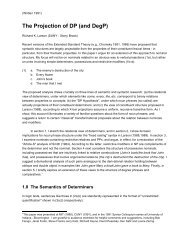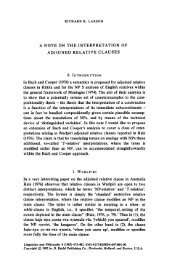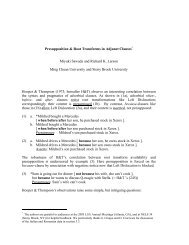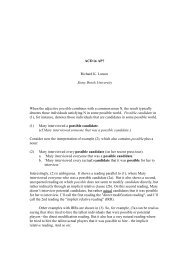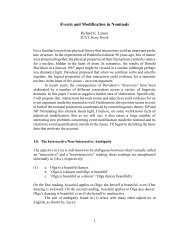Intensional Transitive Verbs and Abstract Clausal Complementation
Intensional Transitive Verbs and Abstract Clausal Complementation
Intensional Transitive Verbs and Abstract Clausal Complementation
You also want an ePaper? Increase the reach of your titles
YUMPU automatically turns print PDFs into web optimized ePapers that Google loves.
<strong>Intensional</strong> <strong>Transitive</strong> <strong>Verbs</strong> <strong>and</strong> <strong>Abstract</strong> <strong>Clausal</strong> <strong>Complementation</strong><br />
obliterating all meaning differences between seek, search-for, hunt-for, etc. However, a less mechanical<br />
implementation of Quine’s idea is available in which these distinctions are not lost. Note that surface<br />
transitive constructions like (68a) can be paraphrased with infinitives embedded under try, as in (68b), but<br />
they can also be paraphrased as in (68c):<br />
(68) a. Max is looking for/seeking survivors.<br />
b. Max is trying [ CP PRO to find survivors].<br />
c. Max is looking/seeking [ CP PRO to find survivors].<br />
This result is somewhat surprising insofar as look-for <strong>and</strong> seek appear to be equivalent to try to find in<br />
(68a), but equivalent to try alone in (68c) since ’find’ is contributed independently. One possibility, of<br />
course, is that there are simply two different verbs in each case: for example, one look, an intensional<br />
transitive with the meaning ’try-to-find’, <strong>and</strong> the other a distinct clause-taking look with the meaning ’try’.<br />
An alternative, however, is that there is just one verb here, equivalent to try, <strong>and</strong> that the additional<br />
component of meaning found in (68a) results from incorporation of an abstract, independent predicate<br />
equivalent to that found overtly in (68c).<br />
We suggest the latter analysis. More precisely, we propose that intensional transitive look <strong>and</strong> the<br />
other verbs of this class select a clausal complement containing an abstract predicate FIND. As in the<br />
analysis of the volitional class, the VP containing the object first moves to CP Spec (69a). From there, the<br />
complement V (FIND) <strong>and</strong> complementizer incorporate into the matrix verb (look) (69b). Finally, the<br />
complement object (survivors), raises to Agr o Spec (69d), yielding the final form: 31,32<br />
31 Getting ahead of ourselves slightly, the treatment of intensional transitiveseek/look-for <strong>and</strong> propositional<br />
seek/look-for plus find raises questions about the alleged transitivity of find (see Ludlow 1985, who attributes the<br />
observation to Josef Stern, <strong>and</strong> Kaplan 1986). The issue is that even if the site of Troy is also the location of Joe’s<br />
Car Wash, (ii) does not follow from (i).<br />
(i) Max found Joe’s Speedy Car Wash.<br />
(ii) Max found the site of Troy.<br />
This in turn raises questions should we want to defend a general thesis about the link between intensional contexts<br />
<strong>and</strong> clausal complements (see section 6 for discussion of this possibility).<br />
The nature of find bears on a range of interesting issues that we cannot go into here apart from a few<br />
suggestions for further investigation. One possibility is that find is itself ambiguous between an extensional find an an<br />
intensional one.<br />
32 The restructuring analysis of English try/look-for/seek may appear questionable given that the Italian counterparts<br />
of these verbs do not show restructuring properties; the case of try/look-for/seek diverges from want in this respect.<br />
However, in an interesting study of restructuring constructions, Wurmbr<strong>and</strong> (1996) argues that German versuchen,<br />
’try’, is a restructuring verb on the basis of the availability of "Long Distance Scrambling" (i):<br />
(i) weil der Hans [das Bier] i versuchte [ t i zum Bahnhof zu bringen ]<br />
since Hans the beer tried to-the train station to bring<br />
’since hans tried to bring the beer to the train station’<br />
On the basis of this, it appears that a restructuring analysis with try/look-for/seek must be available in principle,<br />
although cross-linguistic variation with respect to the overt clausal cases must be left as an unsolved problem at this<br />
point.<br />
27



